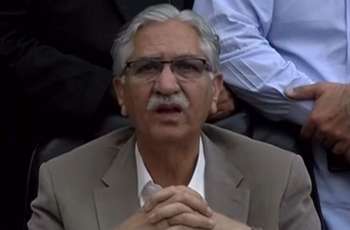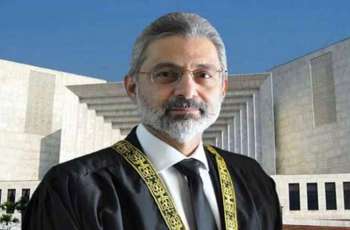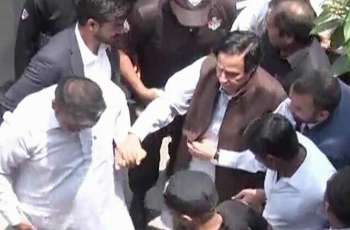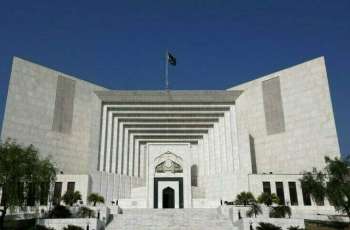MOSCOW (Pakistan Point News / Sputnik - 05th December, 2018) OSCOW, December 5 (Sputnik), Valentina Shvartsman - The opening of the long-proposed Kartarpur border corridor between India and Pakistan can be seen as a major event in bilateral ties but is unlikely to bring any significant progress in reconciliation due to long-existing territorial disputes, especially ahead of looming elections in India, experts told Sputnik.
On Wednesday, politicians from India and Pakistan held a groundbreaking ceremony for the new border crossing, which would allow India's Sikh minority to visit holy sites in Pakistan without a visa. The Kartarpur corridor connecting two major Sikh shrines in India and Pakistan is expected to officially open next year, in time for the 550th anniversary of Sikh Guru Nanak's birth. The idea to open this crossing had been around since 1980s, but the project was always hindered by the political and diplomatic standoff between the two countries.
At the ceremony, Pakistani Prime Minister Imran Khan said that all political powers in the country as well as military establishment were "on one page" with regard to seeking better relations with India. The Pakistani leader urged New Delhi to make "one step forward" toward friendship between the two countries, as well as for cooperation in trade and ending poverty. Indian Prime Minister Narendra Modi, in turn, welcomed the opening of the border corridor by comparing it to the fall of the Berlin Wall.
Vinay Kaura, an assistant professor at the Department of International Affairs of the Sardar Patel University of Police, Security, and Criminal Justice in the Indian state of Rajasthan, said in his comments to Sputnik that even though the Pakistani prime minister's remarks could be seen as a major development with India, his words did not carry "much political weight."
"This is indeed a major development. However, Imran Khan has secured the position of prime minister largely due to hidden or not-so-hidden support of the military-intelligence complex in Pakistan. His words do not carry much political weight as whatever he is speaking regarding India-Pakistan ties is essentially what the military wants him to convey. There is no meaningful change in Pakistan's policy towards India," the expert said.
He noted that Pakistan's military establishment did not want better ties with India "since it would reduce their budgetary allocations and privileged position."
On the other hand, Dr. Manzoor Khan Afridi, the head of the politics and International Relations Department at the International Islamic University in the Pakistani capital of Islamabad, argued that the new corridor could open the way for better ties between the two countries.
"It is a significant move that amidst the deteriorated relationship with India, such a positive step to open a cross-border corridor will help for mending ties between the two states. Pakistan's military being welcoming the initiative of the government, and a large majority of Pakistani masses prove that Pakistani nation as a whole is on same page about peace with India," the expert said.
Dr. Yaqoob Khan Bangash, an assistant professor at the Information Technology University in Pakistan's Lahore, noted that while the move did not represent any significant change in Pakistan's position, Islamabad used it show its readiness for peace talks with India and increase its support among the Sikh community in the neighboring country.
"The opening of the Kartarpur corridor has been a long standing offer of Pakistan and was especially advocated by former dictator Pervez Musharraf. Hence it is nothing new. By opening the corridor Pakistan wants to achieve the things: first is to show to the world that it's open to peace with India and that it's only India which obstructs. Secondly, it wants to solidify its support amongst the Sikhs in India and around the world," Bangash told Sputnik.
According to Dr. Zahid Ahmed, Research Fellow at the Alfred Deakin Institute for Citizenship and Globalization of the Deakin University, the recent peacemaking statement by the Pakistani leader might also be linked to Islamabad's ambitions regarding the $46 billion China-Pakistan Economic Corridor (CPEC) infrastructure project, which aims to boost the region's integrity by connecting the Pakistani port city of Gwadar and China's Xinjiang Uyghur Autonomous Region.
"This also is a reflection of Pakistan's desire to attain sustainable stability and security in the country and the region that will help its own development by for example maximizing the outcomes of the China-Pakistan Economic Corridor (CPEC). This multi-billion Dollar China project is a key motivation to deal with internal and external security challenges. The government that faces enormous economic challenges realizes that peace is a pre-requisite for economic development in the country," Ahmed said in his comments to Sputnik.
The relations between India and Pakistan have been tense ever since the former British-controlled territories were partitioned in 1947. In particular, India and Pakistan each lay claim to a portion of the Kashmir region, which has often been a source of conflict between the two countries.
Aparna Pande, the director of the Initiative on the Future of India and South Asia at the Hudson Institute, told Sputnik that major disagreements on the long-standing territorial dispute were very likely to hamper possible peace process.
"India wants no territorial change in Kashmir valley, whereas Pakistan has been a revisionist nation demanding that whole Kashmir be given to it. This cannot be accepted by any Indian government," she said.
Furthermore, the Indian government has been struggling with insurgency in the region since the late 1980s. New Delhi has repeatedly accused Islamabad of supporting the insurgents.
According to Pande, India will make a step toward better ties with Pakistan only if military authorities in Islamabad take steps to end cross-border terrorism, including the activities of the Lashkar-e-Taiba terrorist group (banned in Russia), blamed for a four-day attack in the Indian city of Mumbai in November 2008.
"If the Imran Khan government wants India to believe that this time there is real change, he will need to bring the Pakistani security establishment on board and ensure that they change their view of India and end the use of terrorism against India. Action against terror groups like Lashkar-e-Taiba - the group that attacked Mumbai in 2008, but there has been no movement on that case for 10 years - would be a start. Till Pakistan demonstrates some action on terrorism there is little chance that India will resume a formal dialogue," Pande told Sputnik.
Possible reconciliation is also complicated by the upcoming elections in India, as the ruling Bharatiya Janata Party (BJP) is heavily relying on the anti-Pakistan sentiment in its campaign, Bangash noted.
"India will not take any steps towards Pakistan till after the May 2019 elections. The BJP and Prime Minister Modi have made their mark in being anti-Pakistan and anti-Muslim and that wins them votes. They will not change their stance even if they know that something will certainly improve relations with Pakistan. The BJP has cultivated a strong anti-Pakistan vote bank in the Hindi heartland and will not risk anything," the expert said.
Similar concerns have been voiced by Dr. Zubair Iqbal, a scholar at the middle East Institute and former Assistant Director of the Middle East and Central Asia Department of the International Monetary Fund.
"Both countries try to 'normalize' relations following elections but differences are amplified in the run-up to elections. That is what is happening at present: while Pakistan is trying to use the narrow window to ease conflict, Indian government, in the run to elections, is ramping up the conflict. It is unlikely that Pakistan's overtures will elicit positive responses from India," the expert told Sputnik.
Several Indian media alleged over the past week that the initiative to open the Kartarpur Corridor was "a googly" by the Pakistani prime minister to ensure New Delhi's participation in bilateral talks. On Saturday, the Pakistani Foreign Ministry said in a statement that it was "deeply dismayed at the relentless negative propaganda campaign," noting that Islamabad was guided by the "longstanding wishes" of the Sikh community when deciding to launch the initiative.



